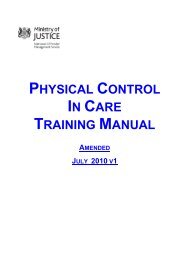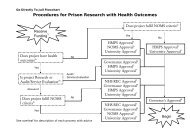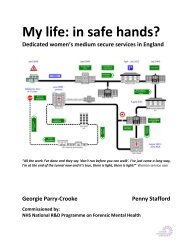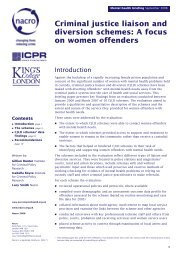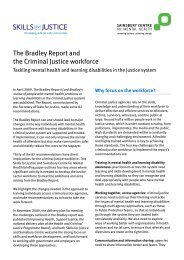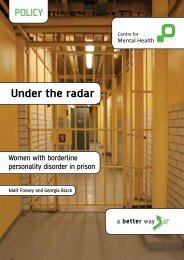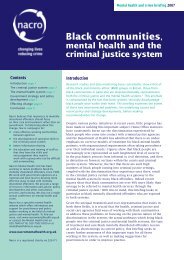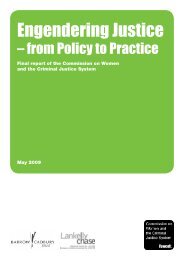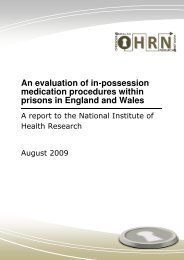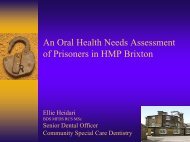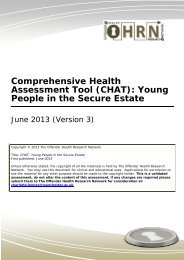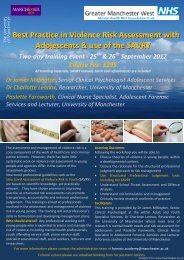10 top tips for PCT Boards - Centre for Mental Health
10 top tips for PCT Boards - Centre for Mental Health
10 top tips for PCT Boards - Centre for Mental Health
- No tags were found...
You also want an ePaper? Increase the reach of your titles
YUMPU automatically turns print PDFs into web optimized ePapers that Google loves.
2Does the <strong>PCT</strong> commission‘places of safety’?Where a person is suspected of having amental health problem and is in need ofimmediate care or control, the police can useSection 136 of the <strong>Mental</strong> <strong>Health</strong> Act 1983to take the person from a ‘public place’ to a‘place of safety’ <strong>for</strong> up to 72 hours.Police stations are often crowded and chaoticplaces. The <strong>Mental</strong> <strong>Health</strong> Act Code of Practicesays that they should only be used as a lastresort. Yet an estimated 11,000 people aredetained in police stations as places of safetyeach year and many police <strong>for</strong>ces say theyhave no alternative.Action:Appropriately staffed Placeof Safety suites shouldbe commissioned by <strong>PCT</strong>s, preferably inhospitals, <strong>for</strong> individuals detained undersection 136. The use of the third sector asservice providers can be particularly useful.3Has the <strong>PCT</strong> commissionedservices to enable courtsto arrange <strong>Mental</strong> <strong>Health</strong>Treatment Requirements(MHTRs)?The MHTR is an option available to sentencersthat ensures mental health treatmentalongside other community sentence options.It can be particularly effective <strong>for</strong> people whohave disengaged from services. But it hasbeen used very little. Local mental healthteams are not always equipped or willing totake on clients with an offending history.Action:<strong>PCT</strong>s should ensure thatthe services theycommission are available and responsive tothe needs of people needing services in thecourts, and that the protocols <strong>for</strong> deliveringMHTRs are in place.4Has the <strong>PCT</strong> commissioned‘equivalent’ mental healthservices <strong>for</strong> its prisons?About 90% of adult prisoners have at leastone mental health problem, while one in <strong>10</strong>has a severe mental illness: ten times the rateoutside prison. <strong>Mental</strong> health ‘inreach’ teamsare still overstretched and under-resourced,and prison mental health care falls wellshort of what is equivalently available in thecommunity.Last year, £20.8 million was spent on mentalhealth care in prisons. This is just £300 perprisoner and is only about a third of what isneeded. Spending on prison mental healthcare also varies widely across the country.Some NHS regions spend more than twice asmuch per prisoner than others. This variationis not explained by different levels of need orcosts.Action:<strong>PCT</strong>s should ensure theycommission an equivalentlevel of mental health care <strong>for</strong> prisonerscompared to that available in the community.5Are local offendermental health servicesappropriate <strong>for</strong> women?Female offenders experience very high levelsof mental distress, often related to separationfrom their children. One third of womenin prison have had a previous psychiatricadmission. Half of all self-harm incidents inprison are by women despite only making up6% of the prison population.Action:<strong>PCT</strong>s should commissiongender-sensitive andspecific services <strong>for</strong> women, as recommendedby the Corston Report in 2007.
6 8Are local offender mentalhealth services sensitiveto the needs ofBME groups?People from many Black and minorityethnic (BME) backgrounds are greatly overrepresentedin acute psychiatric wards, securehospitals and custody. But they are less likelyto be referred <strong>for</strong> psychological therapiesor early interventions. This prompted theGovernment’s Delivering Race Equality (DRE)action plan in 2005.Action:<strong>PCT</strong>s need to commissionculturally sensitive andspecific services <strong>for</strong> BME groups. Somevoluntary sector provision might be betterequipped to meet these needs.7Has the <strong>PCT</strong> commissionedan appropriate number ofsecure hospital beds?A vast amount is currently spent on <strong>for</strong>ensicmental health services, which play animportant part in the diversion process.Forensic services provide secure detentionin NHS-funded beds when prison isinappropriate.There are nearly 4,000 people in <strong>for</strong>ensicservices (an average of just over 25 per <strong>PCT</strong>).In addition, the number of people newlytransferred from prison or courts into <strong>for</strong>ensicservices is increasing every year.Action:At a cost of more than£150,000 per bed per year,<strong>for</strong>ensic services put a great deal of pressureon <strong>PCT</strong> budgets. It is there<strong>for</strong>e essential that‘step-down’ and low security services are alsocommissioned <strong>for</strong> patients to move on to,when suitable, at a lower cost.Has the <strong>PCT</strong> commissionedmental health servicesappropriate <strong>for</strong> childrenand young peoplewho offend?Children in the youth justice system arethree times more likely than others to showthe early signs of mental ill health. Manyhave complex needs, which on their own donot meet the criteria <strong>for</strong> community supportservices but which together undermine theirability to achieve their potential. <strong>PCT</strong>s havethe opportunity to intervene early to reducethe chances of costly poor mental health asthese young people mature.Action:<strong>PCT</strong>s should commissionsystematic processes toidentify young people with mental healthdifficulties at the first point of entry into theYouth Justice System. Youth Justice Diversionand Liaison workers should be funded toscreen young people be<strong>for</strong>e charge and toliaise with the police, courts and the YouthOffending Teams to refer them to appropriatesupport services.Local work should be supported throughregionally commissioned specialist teams<strong>for</strong> young people and families with the mostcomplex needs. These teams would advise onand work with those small number of caseswith the highest level of vulnerability andposing the greatest level of complexity andrisk in the region.Integrated service teams:In January 2007, Tel<strong>for</strong>d and Wrekinintroduced ‘integrated service teams’ toimprove access to early interventions,coordinate partnership working and makeexpertise more readily available to frontlinepractitioners. The teams have been ableto reduce inappropriate referrals to morespecialist and often more costly services suchas CAMHS due to their knowledge of local carepathways and their increased confidence insupporting cases at this less specialist level.
9 <strong>10</strong>Has the <strong>PCT</strong> commissionedservices to enable theresettlement of peoplewith mental healthproblems on leavingprison?Continuity of care is essential <strong>for</strong> people bothentering and leaving custody. Professionals inand out of prison emphasise the importance ofworking with prisoners prior to and followingrelease, but this can be difficult in practice.Prisoners with complex needs may needsupport from many different agencies.Action:Key care co-ordinators canhelp released prisoners tonavigate through the large number of agenciesthey need to access, such as mental health,substance misuse, housing, and employmentservices.For prisoners with severe and enduring mentalhealth problems, this role would be carriedout by a Care Programme Approach (CPA)care coordinator. For prisoners with commonmental health problems, such as depressionand anxiety, the role could be fulfilled by anagency that can liaise between prison and thecommunity. For children and young people,this role could also be fulfilled through the<strong>for</strong>mal identification of a Lead Professional.Commissioning aftercare:Resettlement and Aftercare Provision (RAP)schemes in the youth justice system providea worker who meets people early on in theirsentence, plans a support package <strong>for</strong> theirrelease, picks them up on the day of releaseand later helps them to keep appointmentsand sort out a range of practical problems.Although voluntary, RAP has a high take-upfrom young people who are overwhelminglypositive about the nature and style of helpoffered. Similar support could be extendedto adults through joint commissioningarrangements.Has the <strong>PCT</strong>commissioned mentalhealth services <strong>for</strong>ex-prisoners?Not every <strong>PCT</strong> has a prison, but all <strong>PCT</strong>s willhave people in their community who havebeen, or who will at some time go, to prison.Public Service Agreements, a ‘must do’ <strong>for</strong>all public services, include several importanttargets <strong>for</strong> supporting ex-offenders. PSA 16,on social exclusion, includes employmentand settled accommodation <strong>for</strong> ex-offenders,while PSA 23, <strong>for</strong> safer communities, includestackling the causes of offending and improvinghealth care to offenders.Action:<strong>PCT</strong>s could play their partin supporting ex-offendersthrough a Local Enhanced Service (LES) tooffer additional support to excluded groupssuch as ex-prisoners and the homeless.Primary care teams could work closely withsocial services, drug and alcohol servicesand mental health teams to provide a tailoredservice and develop innovative models of care,not based on the traditional GP surgery.Sainsbury <strong>Centre</strong><strong>for</strong> <strong>Mental</strong> <strong>Health</strong>Sainsbury <strong>Centre</strong> is an independent charityworking to improve the quality of life of peoplewith mental health problems. We have carriedout extensive research into the mental healthof people in the criminal justice system.For more in<strong>for</strong>mation visit www.scmh.org.ukand sign up to our monthly email bulletin.134-138 Borough High Street, London SE1 1LBTel: 020 7827 8300 Fax: 020 7827 8369www.scmh.org.ukCharity Reg No <strong>10</strong>91156. A company limited byguarantee registered in England and Wales No 4373019.



